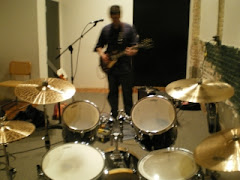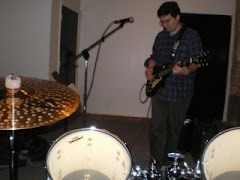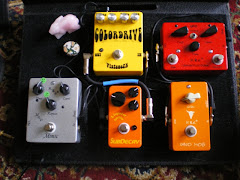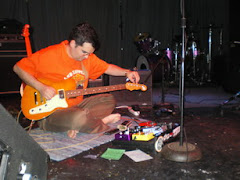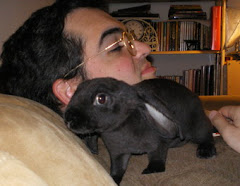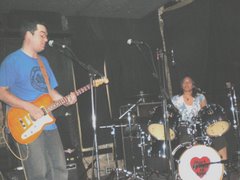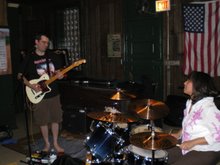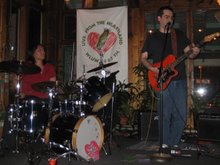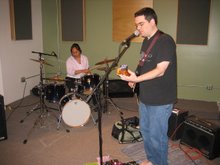
We’re sick this morning. Both of us. With the same thing. Sore throat. Headache. Congestion. Cranky. Conversation this morning went something like this:
“You don’t love me.”
“I do.”
Cough. Cough.
“I want a movie.”
“Which one?”
“Something stupid.”
“Okay.”
“You don’t love me.”
“I do.”
Like I said, cranky. Whenever I’m sick like this – cranky, tired, sore throat sick – I occasionally remember the day my drum set arrived. The hunter green one I bought off Craig’s List for $370. I was sick then, too. Flu-sick. And it was December…
(insert here: a swirly flashback effect)...
It’s December 23rd and I’m in bed with an arm over my eyes and swallowing. Am I going
to vomit now? I swallow.
No. Not now.
My stomach churns. Under the heavy wool clothes, I am damp and sweaty. I cough. My throat is dry and sore. At the same time my nose and sinuses are full and wet.
I am lying in bed with the flu. But I want to be up with Brian sitting on the couch waiting for the drum set to arrive. I wait to hear the doorbell ring which would mean the filmmaker from
I searched Craig’s List for a week looking for a drum kit I could afford. I was not even sure what I needed or what I should be looking for in terms of quality. All I knew was that I had about 400 dollars to spend. I had 200 and Brian was giving me 200. Everything on Craig’s List seemed like it was 600 dollars or more. What made it worse was that it was Christmas and every parent in the country was probably looking for a kit for their kid. But I hunted until I finally realized that I would be willing to drive an hour or two to
When he answered the phone, he seemed eager.
“Hi, I e-mailed you about the drum set.”
“Yeah!”
There was a pause. I wasn’t sure what I was supposed to ask.
“So…” I said, trying to make time while I figured out what to say next. “You’re selling the one in the ad on Craig’s List?”
“Yeah. It pretty much is what you see. I bought it thinking I would overcome my fear of drums, but I never got around to it. I bought it used from a guy, but it looks like he didn’t play it much.”
“So why are you selling it?”
“Well, I’m a filmmaker and I need the money to finance the movie I’m working on.”
“Oh. What’s your movie?” I asked that because I didn’t know what to ask abou the drum set. He proceed to tell me about a man in
“I’d like $400,” he said. “But I’m willing to negotiate.”
“How about $350?” I asked. “I live in
“You live in
His enthusiasm for that fact took me aback. “Yeah, why?”
“I had to go through
“Okay, how about twenty bucks?”
A pause. “Okay.”
And we sealed the deal. I told him where I lived and how to get here from
Two days later, I have the flu. The filmmaker said he would be arriving around
I hear Brian’s cell phone ring and then I hear him giving directions to someone. “Just go west on
Brian’s voice fades away as I feel a wave of nausea surge upwards again from my stomach. I fall asleep and from somewhere in my sleep, I hear the doorbell ring. I listen as two male voices speak to Brian and I hear heavy objects being brought into the kitchen. The voices recede again towards the front door and the door closes. A minute later Brian’s hand is on my shoulder.
“It’s here.”
I open an eye. “Yay…” I mutter into the pillow.
“Do you want to see it?”
“Sure.” I pull myself out of bed, the air of the room is frigid against the heat of my body and I shiver. I grab a blanket and wrap it around me.
On the floor of the kitchen is a pile of green drums, stands, and cymbals. It looks like the limbs of a skeleton, taken apart and scattered across the kitchen.
“What do you think?” he asks.
“It’s nice….”
“You don’t like it?”
“I do…” But that’s when the reality of it hits me like a stick. Can I learn how to play those? Would I be able to?
Doubt creeps over my head and pounds on my brain. I feel myself get dizzy and the drum set turns into a pool of inky green before my eyes. I walk out of the kitchen back into the bedroom and pull the covers over my head. Is this some hopeless dream?
A year later, I realize it wasn’t a hopeless dream. I play the drums now – perhaps not as well as I would like – and I play them in public – perhaps not as well as I would like, but I play them. So now I know nothing’s really hopeless…I think.









